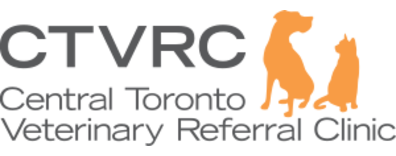Central Toronto Veterinary Referral Clinic
Cardiology
A veterinary cardiologist is one who specializes in the diagnosis, treatment, and management of diseases affecting the hearts of animals.

What is an ACVIM/ECVIM Cardiology Diplomate?
A veterinary cardiologist is one who specializes in the diagnosis, treatment, and management of diseases affecting the hearts of animals. An ACVIM/ECVIM cardiology diplomate is one that has achieved board certification through the American College of Veterinary Internal Medicine or the European College of Veterinary Internal Medicine, which are the major organizations for veterinary internal medicine. The path to becoming a veterinary cardiologist involves at least a year of a general rotating internship (occurs after acquiring a 4 year Doctor of Veterinary Medicine degree), often followed by a year or more of specialty internships before acceptance into a 3-4 year cardiology residency program. This residency is supervised by ACVIM/ECVIM cardiology diplomates to ensure the highest standards. A comprehensive general medicine board exam followed by an intensive cardiology examination must be passed during this residency, along with clinical and research milestones before achieving board certification. Following this, veterinary cardiologists must continuously update their knowledge of the specialty to maintain their specialty designation.
Diseases We Treat:
The Cardiology Team specializes in the treatment of all cardiac diseases affecting dogs and cats. Common diseases that are managed by our team include but are not limited to:
Degenerative Valvular Disease (aka mitral valve disease/degeneration): the most common acquired heart disease of small dogs characterized by a leaky valve causing enlargement of the left heart.
Dilated Cardiomyopathy: a disease of the heart muscle resulting in a weakened and dilated heart. This is one that tends to affect mostly large breed dogs such as Doberman Pinschers and Great Danes, but recently there have been some atypical breeds affected with some suspicion of a link with diet. See: https://www.fda.gov/animal-veterinary/outbreaks-and-advisories/fda-investigation-potential-link-between-certain-diets-and-canine-dilated-cardiomyopathy
Hypertrophic Cardiomyopathy: the most common acquired heart disease in cats where the heart muscle becomes thickened.
Congenital Heart Diseases: Developmental abnormalities of the heart that can limit an animal’s quantity and/or quality of life. Common congenital heart diseases include patent ductus arteriosus (failure of an important fetal vessel to close upon birth), pulmonic stenosis (narrowing of the vessel that brings blood to the lungs from the right heart), and subvalvular aortic stenosis (narrowing of the major vessel that brings oxygenated blood from the left heart to the rest of the body).
Congestive Heart Failure: The end stage of many cardiac diseases where fluid begins to develop in various regions due to failure of the heart to pump effectively. This can manifest in the lungs (pulmonary edema), around the lungs (pleural effusion), or within the abdomen (abdominal effusion/ascites); these are all emergencies that require immediate treatment.
Cardiac Tumours: Tumours that may cause a blockage of the heart or release fluid into the sac around the heart (pericardial effusion).
Arrhythmias: Abnormal electrical activity in the heart that can result in exercise intolerance, weakness, and collapse.
Tests and Procedures We Offer:
The Cardiology Team offers advanced diagnostic testing for cardiac diseases. These may include:
Echocardiogram: An ultrasound scan of the heart to look for structural and functional abnormalities.
Electrocardiogram (6 lead, 9 lead): A test that evaluates the electrical activity of the heart for the presence of arrhythmias or other conduction abnormalities.
Chest X-rays: A diagnostic modality that provides a superficial assessment of the heart, as well as evaluate for the presence of fluid in or around the lungs.
Abdominocentesis and Thoracocentesis: Removal of fluid from various body cavities for either diagnostic or therapeutic purposes.
Medication: Prescription of cardiac medications based on current evidence-based literature, as well as consideration of advanced experimental medications where appropriate.
Meet our Cardiology Team
Dr. Andrew Chong along with his highly skilled team, oversees our cardiology department. He pursued a Doctor of Veterinary Medicine degree at the Ontario Veterinary College followed by a general rotating internship at the Veterinary Emergency Clinic South in Toronto.
